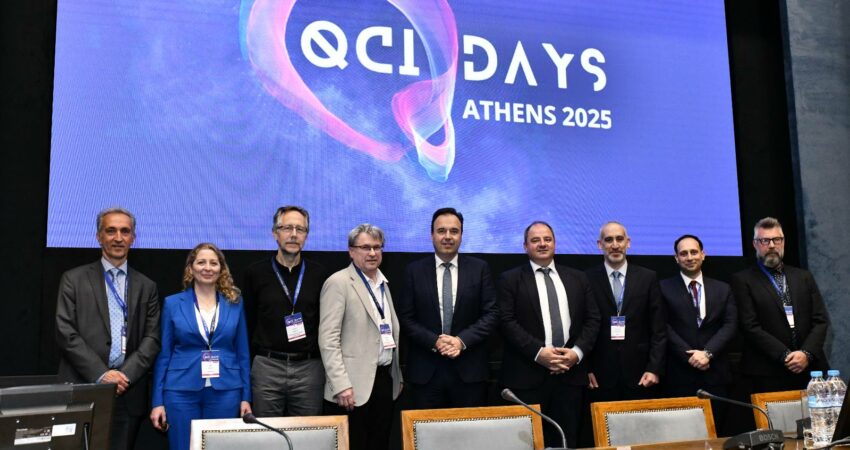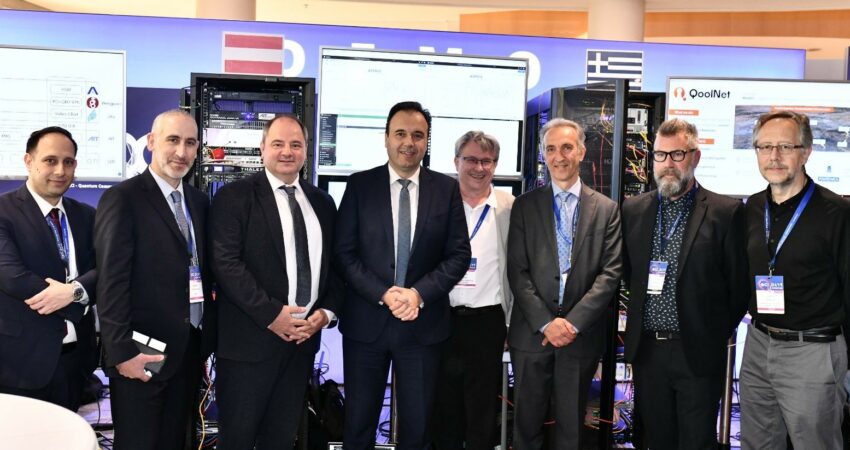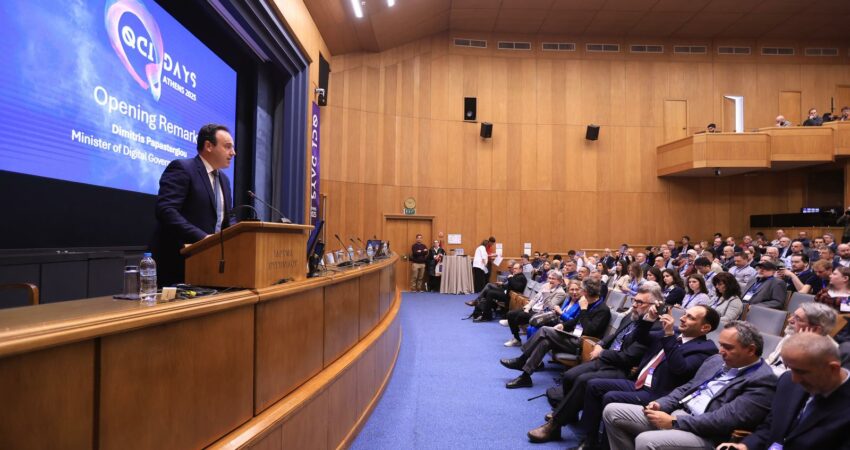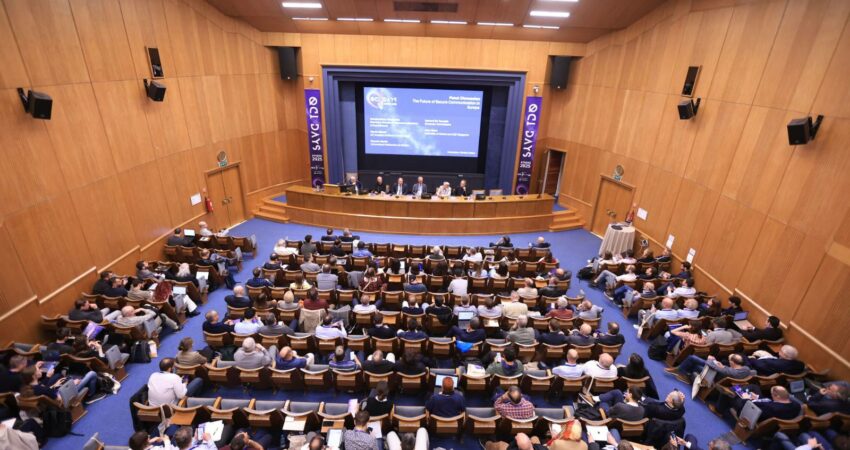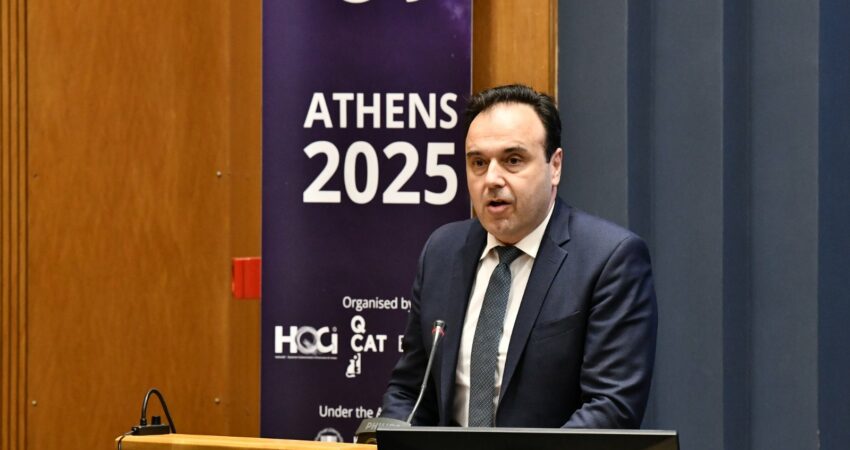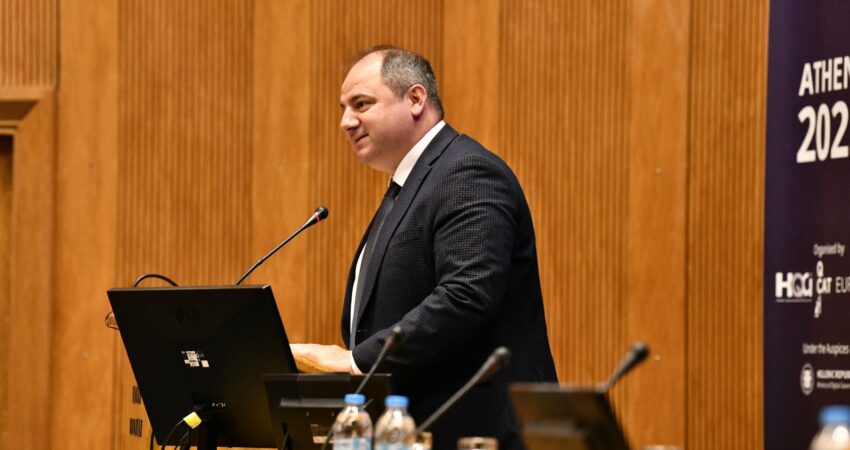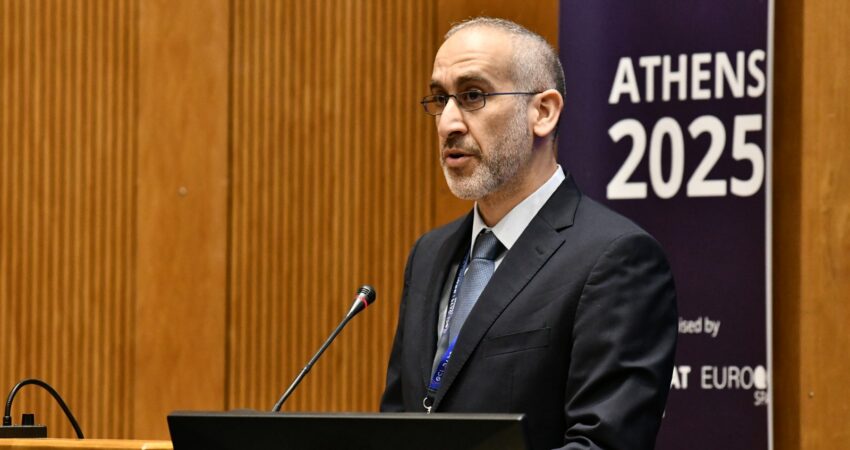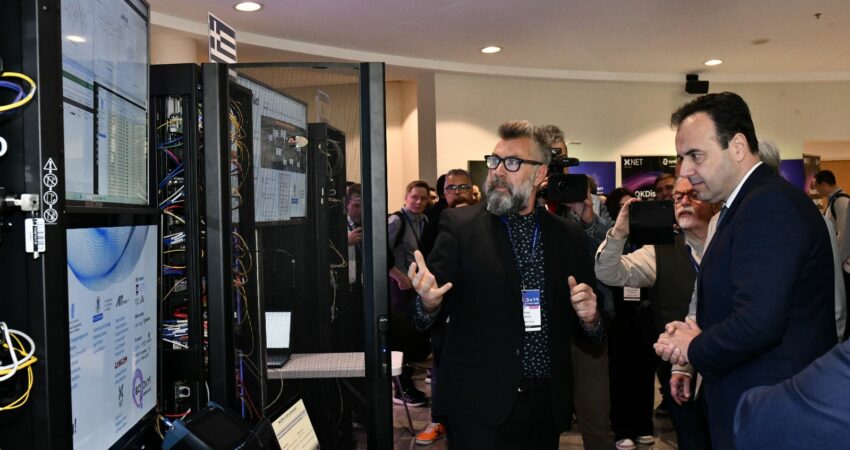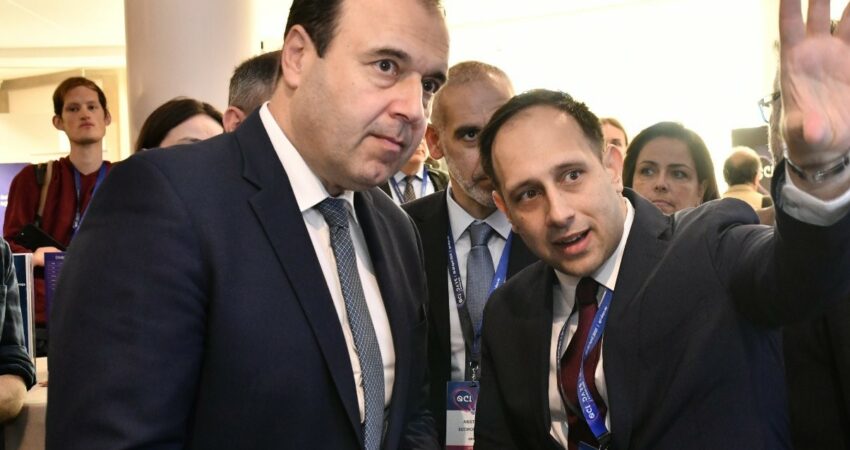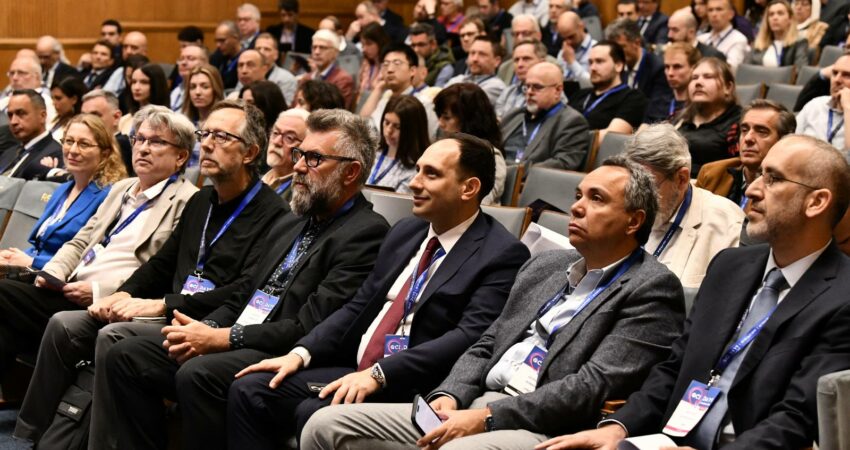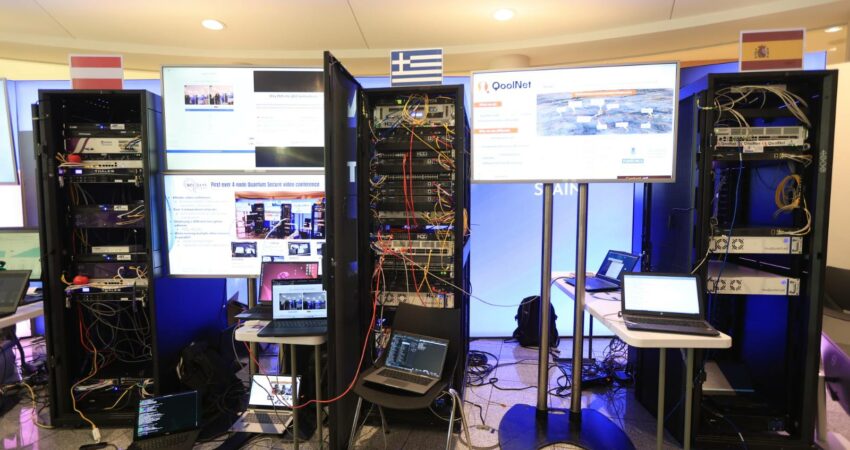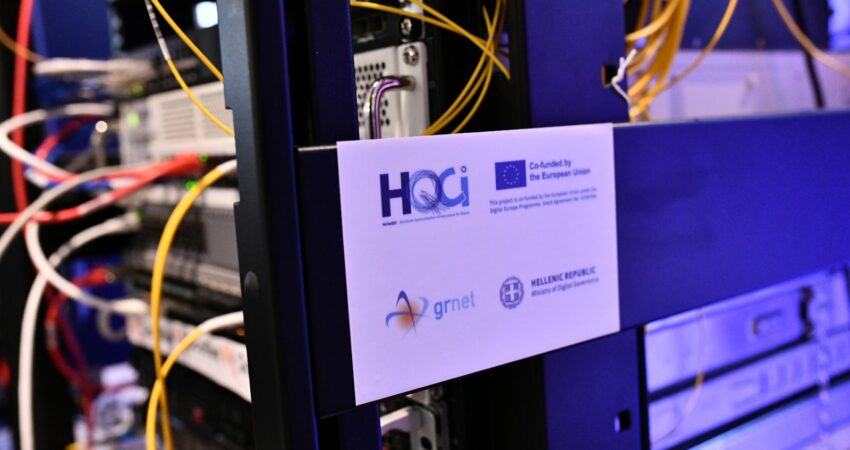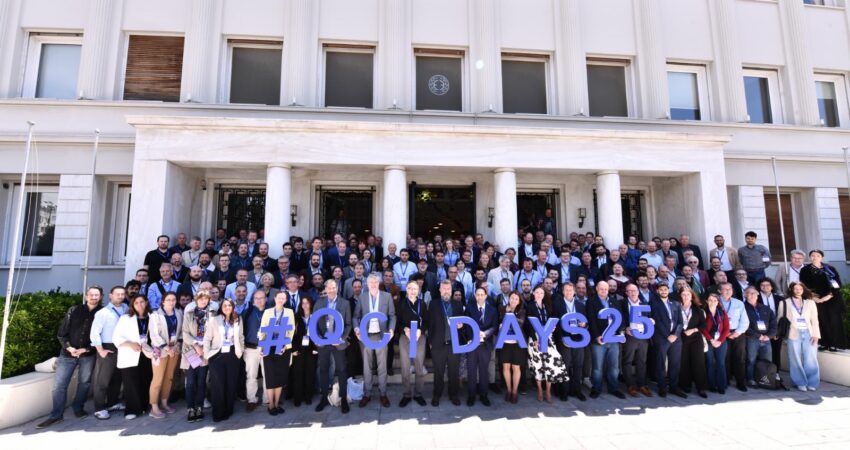This year, Greece took a leading role in the pan-European EuroQCI initiative by hosting the prominent international QCI Days 2025 conference in Athens, from April 28 to 30, at the Eugenides Foundation. The event was supported by the Ministry of Digital Governance, under the guidance of the General Secretariat of Telecommunications and Post, as part of the International Year of Quantum Science and Technology (IYQ) and World Quantum Day 2025.
Following QKD Days Madrid (2022) and QCI Days Vienna (2024), Athens took up the baton to organize this landmark event for the research and technology community of Quantum Communication Infrastructures. The conference was co-organized by the National Infrastructures for Research and Technology (GRNET), the AIT Austrian Institute of Technology (AIT), and the Technical University of Madrid (UPM).
The Minister of Digital Governance, Dimitris Papastergiou, inaugurated the international conference on Monday, April 28, stating: “Greece is at the forefront of European developments in digital security. The future of communications is already here—and it is quantum.”
Welcoming remarks were also delivered by Konstantinos Karantzalos, Secretary General for Telecommunications and Post, Aristeidis Sotiropoulos, CEO of GRNET, Aymard De Touzalin, representative of the European Commission, Ana Rosa Bofill, representative of the Ministry of Digital transformation of Spain, and Representatives of the National Quantum Communication Infrastructures (NatQCIs): Ilias Papastamatiou, coordinator of the HellasQCI project for GRNET, Vicente Martin, professor at UPM, representing EuroQCI Spain, Martin Stierle, Head of the Competence Unit for Security & Communication Technologies at AIT, representing the QCI-CAT project. The conference’s main opening keynote speech was delivered by Artur Ekert, Professor of Quantum Physics at the Mathematical Institute of the University of Oxford, Merton College, Oxford, and the National University of Singapore, as well as founding director of the Centre for Quantum Technologies (CQT).
Pioneering Demonstration of Quantum Encryption Technologies
A key highlight of the conference was a live cross-border demonstration of communication using Quantum Key Distribution (QKD) technologies, connecting the national infrastructures of Greece (HellasQCI), Spain (EuroQCI Spain, using UPM/QoolNet technology), and Austria (QCI–CAT, using AIT technology).
The Greek setup was based on the Athens Metropolitan Quantum Key Distribution Network, part of the national HellasQCI infrastructure. The demonstration utilized a network of 15 nodes and 131 km of optical fibers, connecting four major Greek institutions: the National and Kapodistrian University of Athens (NKUA), the National Technical University of Athens (NTUA), NCSR “Demokritos” and GRNET.
The demonstration showcased actual key exchanges from different vendors, as well as a multilayer implementation of advanced encryption protocols (OTNsec, MACsec, IPsec). The successful operation underscored the technological maturity of HellasQCI and affirmed Greece’s central role in the transition to quantum-secure communications.
This live QKD connection between Greece–Austria–Spain demonstrated that the vision for a pan-European EuroQCI network is progressing rapidly toward implementation.
Leading Sponsors and Exhibitors
Key industry premium sponsors and exhibitors played a vital role in the success of QCI Days 2025, actively promoting innovation in the field of quantum communications. ADAPTIT, NOKIA, ID Quantique and Fortinet were the Premium Sponsors. The conference showcased 20 exhibitors, presenting the latest innovations, technologies, and services in quantum communications. Attendees had the opportunity to explore company developments, witness live demonstrations, and engage in impactful discussions about the future of secure quantum networks.
The strong presence of prominent international sponsors and private-sector exhibitors is a clear sign of growing global confidence in Greece as an emerging hub in the Quantum Communication Infrastructures (QCIs) sector. This momentum reflects progress in infrastructure, expertise, and cross-border cooperation, enhancing Greece’s position on the European and global quantum innovation map. It also opens up new prospects for investment, technology transfer, and strengthening national tech autonomy.
Strong International Participation
More than 600 participants joined the conference, including 300 in person and 300 daily via the GRNET DIAVLOS livestream platform. Delegations from over 30 countries, along with representatives from the European Commission and projects like NOSTRADAMUS and PETRUS, as well as cybersecurity and tech companies, were actively engaged.
Through HellasQCI, Greece showcased significant progress in implementing the national QKD network, with 27 QKD nodes—some experimental, others permanent—serving 13 government and 7 academic/research entities.
Statements from Key Figures:
- Minister of Digital Governance, Dimitris Papastergiou:
“Quantum technologies are no longer abstract or undefined concepts. They constitute a strategic imperative for the European Union, ensuring data security, technological resilience, and our autonomy. As a nation, we regard quantum infrastructures as both a priority and an opportunity—one that enables us to invest in innovation, industry, and the enhancement of our workforce’s digital competencies. Through the HellasQCI initiative, Athens, Thessaloniki, and Heraklion are interconnected via more than 650 kilometers of optical fiber, incorporating three Optical Ground Stations, while we are concurrently investing in satellite-based optical technologies. In this manner, we are taking deliberate and structured steps toward the quantum era, actively contributing to the shaping of Europe’s future. It is for this very reason that hosting the QCI Days 2025 in Athens holds particular significance. Stakeholders, scientists, and policymakers are engaging in meaningful dialogue and strengthening our collaboration in the field of quantum technologies. At the European level, it is imperative that we advance collectively into a digital era in which security and sovereignty are safeguarded—also through the application of quantum technologies.” - Secretary General for Telecommunications and Post, Konstantinos Karantzalos:
“The success of QCI Days 2025 is a milestone for our country, highlighting the strategic importance of collaboration between the public sector, research community, and industry for a secure quantum future.” - GRNET’s CEO, Aristeidis Sotiropoulos:
“HellasQCI goes beyond national boundaries: it lays the foundation for Europe’s collective quantum capability. We invest in skills, knowledge, and infrastructure to ensure a future of digital sovereignty and high-security communication for all.” - Ilias Papastamatiou, Senior Project Manager at GRNET and HellasQCI Coordinator:
“This year’s event brought together over 600 participants and 70 speakers from more than 30 countries—proof that the EuroQCI community is stronger and more united than ever. Trust, hard work, and cooperation have been the foundation of our journey. Only through cooperation can we build a truly operational and secure EuroQCI.” - Giorgos Kanellos, Assistant Professor at NKUA and HellasQCI Technical Coordinator:
“This live cross-border QKD demonstration between Greece, Austria, and Spain marked a major step forward for the EuroQCI initiative. For the first time, a four-node quantum-secure video conference was successfully conducted—an achievement that highlights the overall maturity of quantum communications. With over 130 km of fiber, the Athens Metropolitan QKD Network showcased HellasQCI’s readiness to support large-scale deployments.” - Vicente Martin, Professor at UPM and representative of EuroQCI Spain:
“I’m especially happy that this initiative started in Madrid, a center of innovation and collaboration. I sincerely thank our partners GRNET for the excellent hospitality, and AIT for their outstanding support. This success demonstrates the health of the quantum communications community and shows that international collaboration is key to advancing quantum security.” - Martin Stierle, Head of Security & Communication Technologies at AIT, Coordinator of QCI-CAT:
“Thank you all for gathering here. It’s wonderful to see familiar faces—old friends and trusted partners—as well as welcome new colleagues into our growing community. We’re united by a common goal: to shape the future of quantum communications through QCI Days 2025. Let’s make the most of these three days for a productive and inspiring event.” - Closing remarks by Dimitris Katsianis, Vice President GRNET and Assistant Professor at NKUA:
“This wasn’t just a conference—it was a unique gathering of people and ideas from European institutions, government organisations, academia, industry, and cybersecurity, united by a vision for quantum-secure communication in Europe. Greece proved it is ready to lead, coordinate, and inspire. Through HellasQCI and the contributions of universities, research centers, the private sector and GRNET, we are building much more than infrastructures.”
The conclusion of QCI Days 2025 confirmed unequivocally that National Quantum Infrastructures and the Quantum Internet are no longer abstract concepts—they are becoming real, with active implementation across all EU member states.
Key Highlights
- 600+ participants from 30+ countries
- Live quantum link demonstration between Greece, Spain, and Austria
- 27 QKD nodes nationwide
- High-level political, scientific, and business representation
HellasQCI – Greece’s EuroQCI Pillar
HellasQCI, co-funded by the European Union, is developing Greece’s National Quantum Communication Infrastructure as part of the broader EuroQCI network. Coordinated by GRNET and supported by the Ministry of Digital Governance and the General Secretariat for Telecommunications and Post, the project aims to position Greece at the forefront of quantum technology, providing advanced solutions for the security and connectivity of critical infrastructure.
At the core of the project is the integration of Quantum Key Distribution (QKD) systems, essential for safeguarding sensitive data, ensuring infrastructure resilience, and laying the foundation for new applications in research, education, and innovation.
HellasQCI links three Greek observatories—Helmos (Peloponnese), Holomontas (Thessaloniki), and Skinakas (Crete)—with metropolitan networks in Athens, Thessaloniki, and Heraklion respectively. These are being upgraded into Optical Ground Stations with quantum key distribution capabilities.
The HellasQCI consortium includes:
GRNET (Coordinator), Ministry of Digital Governance, National and Kapodistrian University of Athens, Foundation for Research and Technology – Hellas (FORTH), NCSR “Demokritos,” Aristotle University of Thessaloniki, QUBITECH, SPACE HELLAS, National Observatory of Athens, Motor Oil Hellas (MOH), Research University Institute of Communication and Computer Systems (ICCS), Université du Luxembourg, and South East Technological University (Ireland).
With a vision to accelerate research and innovation, HellasQCI is developing the quantum internet, paving the way for a safe and successful transition to the digital technologies of the future.
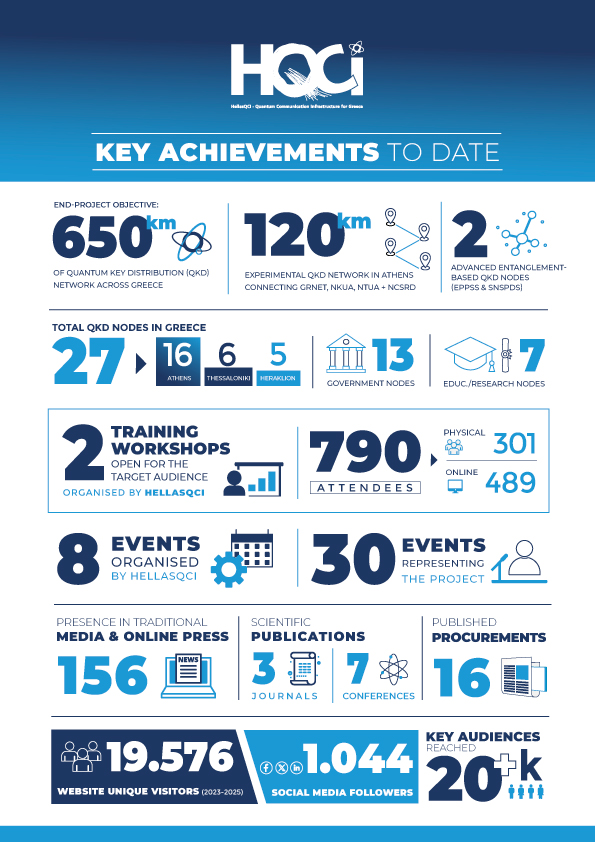
- QCI Days 2025 – Website – Programme here
- DIAVLOS – Recorded Livestream: Day 1, Day 2, Day 3
- GRNET-HellasQCI: https://grnet.gr/business-directory/hellasqci/
- EuroQCI – Website
- HellasQCI – Website
- HellasQCI Project Video: https://youtu.be/zJtuwfxvfvs
